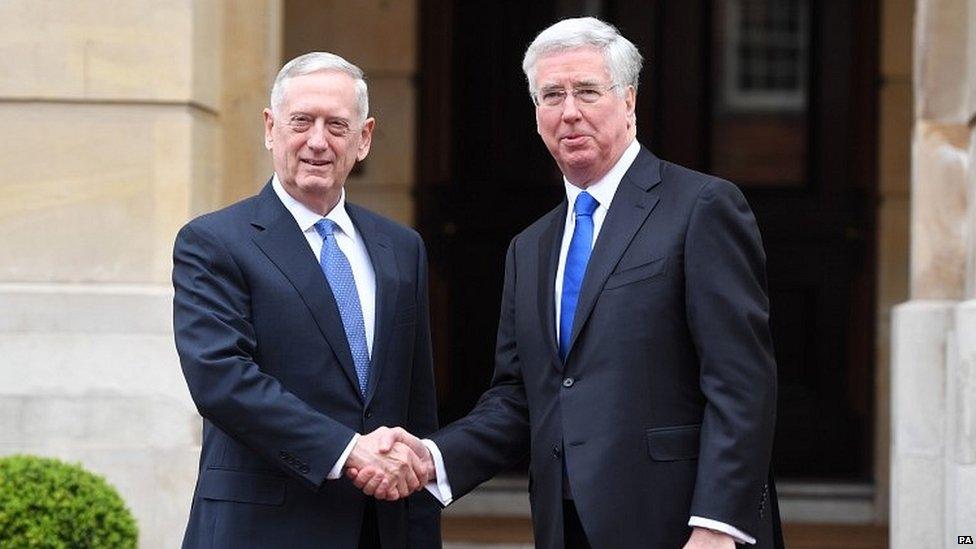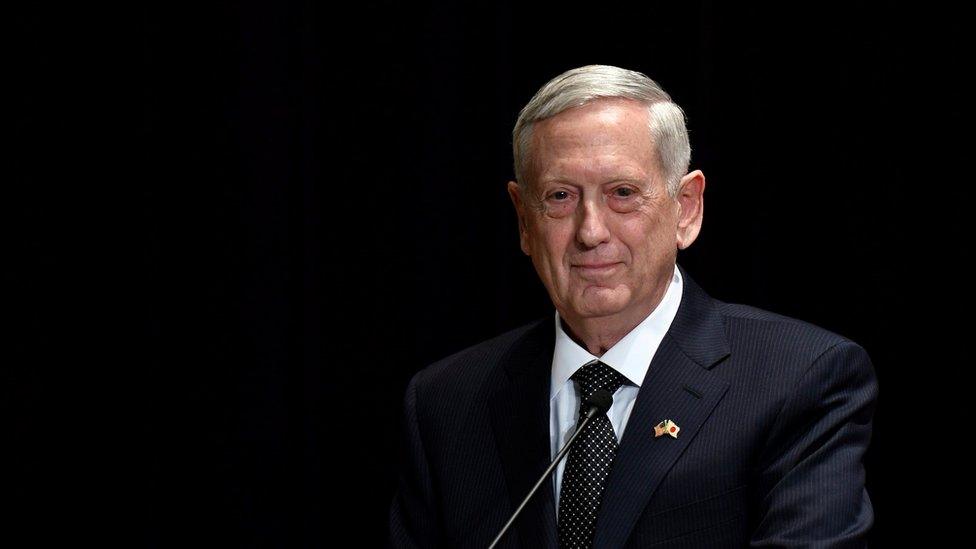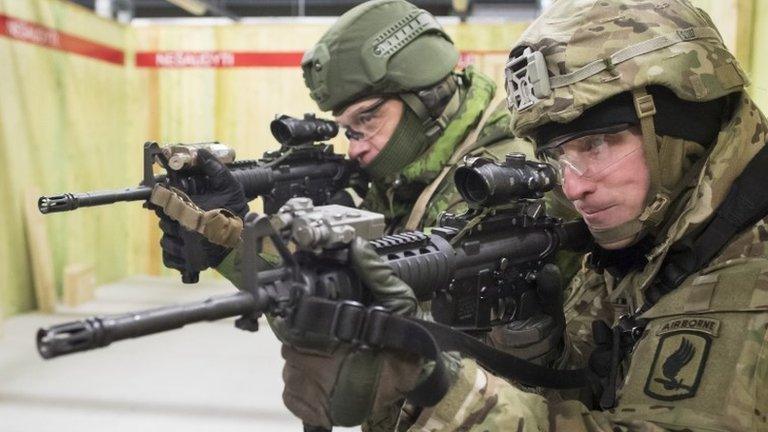Fallon and Mattis discussing Nato spending
- Published
- comments

The US defence secretary is making his first trip to the UK since taking office
Nato members will be "shamed" into spending more on the alliance, defence secretary Sir Michael Fallon has said.
Ahead of talks with his US counterpart James Mattis, Sir Michael said too few of the 28 members were meeting Nato's annual 2% defence spending target and countries needed to "raise their game".
The Trump administration has said other countries must bear more of the cost.
Sir Michael said UK spending was rising but the armed forces must continue to ensure they were "fit for purpose".
Gen Mattis said Britain was an example to other states and its "global leadership is needed today as much as at any time in history".
The Times, external has reported that the Ministry of Defence is facing a £10bn budget shortfall in the next decade, suggesting this could lead to further cuts in personnel.
At the moment, only five of the 28 Nato members - including the US and the UK - spend 2% of their annual income on defence.
The White House has warned that the US could "moderate" its commitment to the 70-year-old defence partnership if other countries don't commit more resources.
Sir Michael Fallon, the defence secretary, refuses to be drawn on Today on cuts to Royal Marines
Sir Michael, who is holding talks with the retired Marine Corps general, said the US had always been the financial mainstay of Nato and no-one wanted to see it retreat from this.
He said the UK had always met the 2% target but too many others did not and this was no longer acceptable.
"There are five members of Nato who don't even spend 1% and I will be working with Jim Mattis on persuading them that they have to raise their game," he said.
"We want other countries to shoulder a fairer share. For instance, getting them to commit to annual increases, and putting the 2% target into their policy documents."
Modernisation
He suggested that publishing a table every year of the progress countries were making towards the 2% target would "shame the others into increasing their defence spending."
Speaking at a joint press conference in Lancaster House, Sir Michael said Nato was the cornerstone of Western security but needed to be "fitter and faster".
Gen Mattis said the two countries were on an "equal footing" in terms of confronting the threat from terrorism, standing together as "bulwarks against maniacs who think by hurting us they can scare us".
Former Nato commander Chris Parry tells Today armed forces funding shortfall is down to "creative accounting"
Their "special relationship", he argued, was "not a historical artefact but a source of strength today for our two nations".
The two are discussing measures to modernise Nato, including streamlining command structures, as well as progress on a series of joint equipment projects including the F-35 Lightning joint strike fighter.
Sir Michael announced £90m investment at RAF Marham in Norfolk to support Britain's consignment of the new aircraft.
But the defence secretary is facing questions about the UK's own future capability amid reports that financial pressures could result in cuts to personnel, including to the Royal Marines.
The defence secretary said the UK had the fifth largest defence budget in the world and the government was committed to increase defence spending ever year up to 2020, including building many new warships.
But he said the armed forces were not immune from having to become more efficient and to adapt to changes in what was being asked of them.
'Poor decisions'
He told the Today programme on BBC Radio 4 that the "balance" of resources within the Royal Navy was a matter for the First Sea Lord.
"What I am saying to you is we have 7,000 Royal Marines... and I have not agreed any cut in the size of the Royal Marines," he said.
He added: "What we are looking at is the way in which our armed forces work, the different tasks that they have and we are constantly looking to see that they are fit for purpose in what we do.
"So if something is no longer needed, if it's redundant, we need to make sure that we can put the savings back into new equipment.
"That applies to buildings, it also applies to the way we work and the efficiencies we need."
But Labour said "mistakes and poor decisions" since 2010 were now coming home to roost and ministers must be clear about where future savings would come from.
"Further cuts of £1bn each year, to make up for this mis-management of the defence budget, will do yet more severe damage to our Armed Forces," said shadow defence secretary Nia Griffith.
"Reports that the Royal Marines could be cut are particularly concerning...The defence secretary kept referring to investment in equipment but he needs to be investing in our forces personnel to ensure that professional standards remain high."
- Published15 February 2017

- Published15 February 2017
